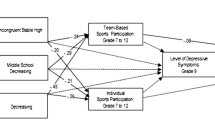Abstract
Research on the relationship of sport participation and adjustment has been largely inconclusive for both males and females. The present investigation addresses this question by comparing male and female participants and nonparticipants on locus of control, a dimension of personality allegedly related to adjustment. Because of social pressures against participation for females, it was hypothesized that women participating on organized teams would reflect a more internal locus of control of their own lives than those who did not participate or participated “for fun” only. No difference between participation groups was predicted for males. The results indicated a sex-by-participation interaction, with female “organized” participants being the most internal and male nonparticipants being the most external. The results, which provide partial support for the hypotheses, were interpreted in terms of context-specific sex-role prescriptions.
Similar content being viewed by others
References
Balazs, E. Psychological study of outstanding female athletes. Research Quarterly, 1975, 46, 267–273.
Bem, S. L., & Lenney, E. Sex typing and the avoidance of cross-sex behavior. Journal of Personality and Social Psychology, 1976, 33, 48–54.
Bird, E. Personality structures of Canadian intercollegiate women ice-hockey players. In G. Kenyon (Ed.), Contemporary psychology of sport. Chicago: Athletic Institute, 1972.
Block, J., Vonder Lippe, A., & Block, J. H. Sex-role and socialization patterns: Some personality concomitants and environmental antecedents. Journal of Consulting and Clinical Psychology, 1973, 41(3), 321–341.
Broverman, I., Broverman, D., Clarkson, F., Rosenkrantz, P., & Vogel, S. Sex-role stereotypes and clinical judgements of mental health. Journal of Consulting and Clinical Psychology, 1970, 34(1), 1–7.
Chandler, T., & Dugovics, D. Sex differences in research on locus of control. Psychological Reports, 1977, 4(1), 47–52.
Dweck, C. The role of expectations and attributions in the alleviation of learned helplessness. Journal of Personality and Social Psychology, 1975, 31, 674–685.
Greendorfer, S. Sex differences in sport involvement: A case of nonconscious inequity. In Sex equity in Illinois schools. Springfield, Ill.: Illinois Office of Education, 1977, Pp. 93–121.
Harris, D. (Ed.), Women and sport: A national research conference. University Park, Pa. The Pennsylvania State University, 1972.
Harris, D., & Jennings, S. Achievement motivation: There is no fear-of-success in female athletes. Paper presented at the Eastern Association of Physical Education of College Women, Hershey, Pa., October 1978.
Helmreich, R., & Spence, J. Sex-roles and achievement. In R. Christina & D. Landers (Eds.), Psychology of motor behavior and sport (Vol. 2). Champaign, Ill.: Human Kinetics Press, 1977.
Kane, J. Psychological aspects of sport with special reference to the female. In D. Harris (Ed.), Women and sport: A national research conference. The Pennsylvania State University, 1972.
Kleiber, D. Free time activity and sense of competence in college students. Unpublished doctoral dissertation, University of Texas at Austin, 1972.
Lefcourt, H. Locus of control. New York: Wiley, 1976.
Lever, J. Sex differences in the games children play. Social Problems, 1976, 23, 478–487.
Lever, J. Sex differences in the complexity of children's play and games. American Sociological Review, 1978, 43, 471–483.
Lynn, R., Phelan, J., & Kiker, V. Beliefs in internal-external control of reinforcement and participation in group and individual sports. Perceptual and Motor Skills, 1969, 29, 551–553.
MacKenzie, M. Women and Sport: A psychological interpretation. In M. Wade & R. Martens (Eds.), Psychology of motor behavior and sport. Urbana, Ill.: Human Kinetics Publishers, 1974.
Malumphy, I. Personality of women athletes in intercollegiate competition. Research Quarterly, 1968, 38, 610–620.
Mushier, C. A cross-cultural study of the personality factors of girls and women in competitive lacrosse. Paper presented at the annual convention of the American Association of Health, Physical Education and Recreation, Seatle, Wa., 1970.
Myers, A., & Lipps, H. Participation in competitive amateur sports as a function of psychological androgyny. Sex Roles, 1978, 4(4), 571–578.
Novak, M. The joy of sport. New York: Basic Books, 1976.
Ogilvie, B. Psychological consistencies within the personality of high level competitors. In W. Morgan (Ed.), Contemporary readings in sport psychology. Springfield, Ill.: Charles C Thomas, 1970.
Ogilvie, B., & Tutko, T. Sport: If you want to build character, try something else. Psychology Today, 1971, 5, 60–63.
Rotter, M. Generalized expectancies for internal versus external control of reinforcement. Psychological Monographs, 1966, 80(1, Whole No. 609).
Spence, J., Helmreich, R., & Stapp, J. Ratings of self and peers on sex-role attributes and their relation to self-esteem and conceptions of masculinity and femininity. Journal of Personality and Social Psychology, 1975, 32(1), 29–39.
Stevenson, C. Socialization effects of participation in sport: A critical review of the research. Research Quarterly, 1975, 46(3), 287–301.
Stoner, S., & Bandy, M. Personality traits of females who participate in intercollegiate competition and non-participants. Perceptual and Motor Skills, 1977, 45(1), 332–344.
Williams, J., Hoepner, B., Moody, D., & Ogilvie, B. Personality traits of champion female fencers. Research Quarterly, 1970, 41(3), 446–453.
Winer, B. Statistical principles in experimental design. New York: McGraw-Hill, 1971.
Author information
Authors and Affiliations
Additional information
The authors wish to acknowledge the critical review of Dr. John Lewko.
Rights and permissions
About this article
Cite this article
Kleiber, D.A., Hemmer, J.D. Sex differences in the relationship of locus of control and recreational sport participation. Sex Roles 7, 801–810 (1981). https://doi.org/10.1007/BF00287765
Issue Date:
DOI: https://doi.org/10.1007/BF00287765




